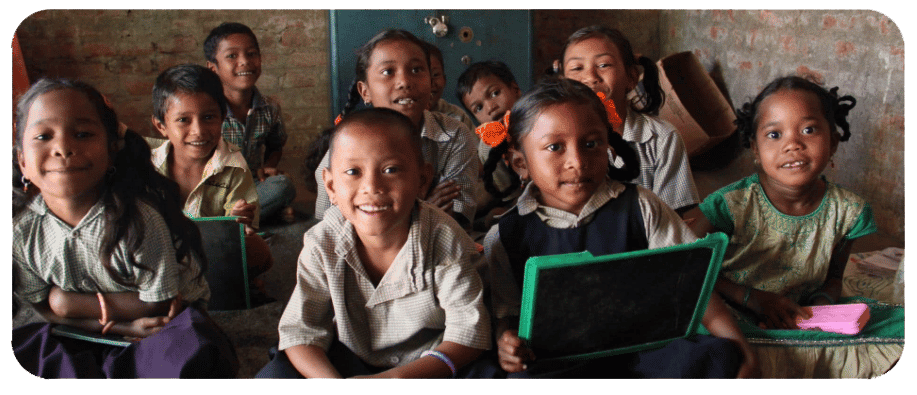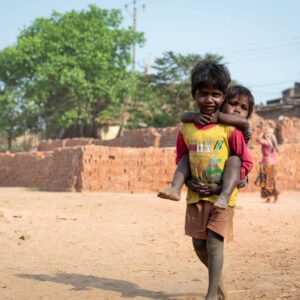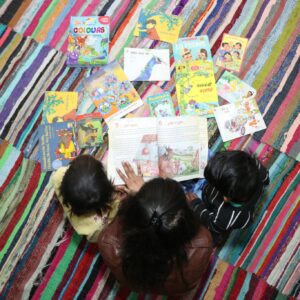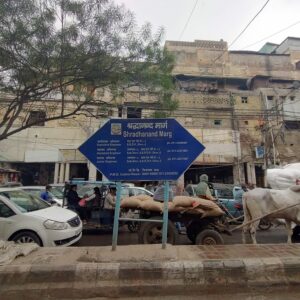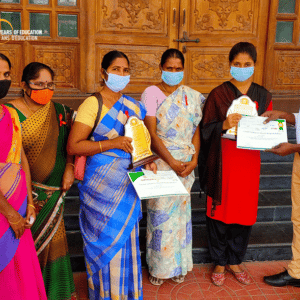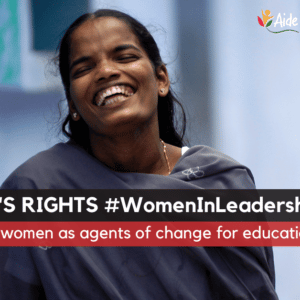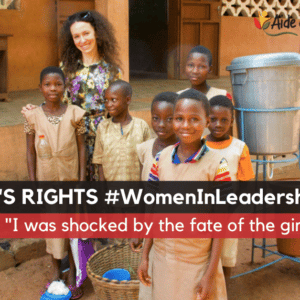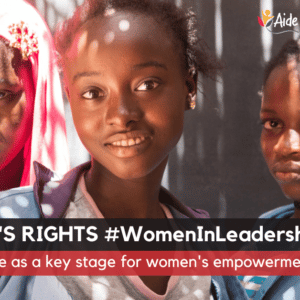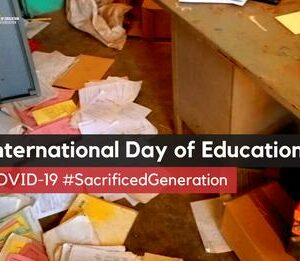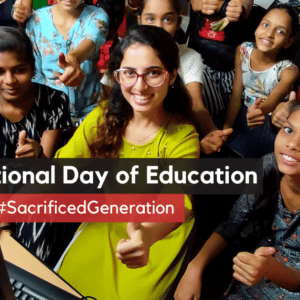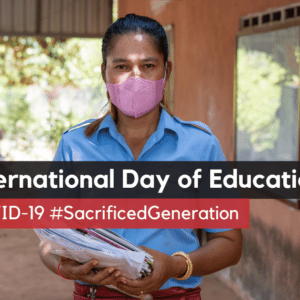School closures and long months of lockdown imposed by COVID-19 have resulted in significant learning losses for all children. Children from the most vulnerable and marginalized communities have been more severely affected than others, says the new report published by Aide et Action on the occasion of the International Day of Education.
“Covid-19: its impact on migrant children from Tamil Nadu” presents the results of a study carried out from January to October 2021 in India among 466 migrant children, having suffered the full brunt of the various lockdowns and social restriction measures imposed by the COVID-19 pandemic. The conclusion is clear: of 466 children interviewed, 272, including 160 girls, had no access to education during lockdown. These children, who are among the most vulnerable to giving up school and dropping out, have literally not studied for the past 20 months. There is now a great risk of never being able to put them back on the path to education.
Children more than vulnerable
India has nearly 100,000 so-called migrant children: they follow their parents, who have no other solution to survive than to leave their native villages to reach large urban centres and work in booming sectors such as construction. or textiles. Families live in slums near workplaces. In this context of extreme poverty, children are rarely re-enrolled in public schools in the Indian states where they settle, especially because of the language of instruction which they do not speak. Most of the time, these children are either put to work or receive the support of development organizations, such as Aide et Action, which has built reception centres on these very places where parents work, allowing daily care for children. Childcare professionals supervise them and guarantee access to learning but also to food, care, and play. But like all countries, India, faced with the progression of COVID-19, was forced to go into lockdown and put in place educational alternatives, especially digital ones. Unfortunately, these already very vulnerable children were mostly excluded due to lack of access to digital tools[1].
Isolated and subject to the worst forms of abuse
Faced head-on with the digital divide, these children found themselves isolated, without support, without any possible help from outside[2].Used to living in slums, under iron shutters,for months these children lived in deplorable conditions, locked in rooms of a few square meters, at 10 or 15, by extreme heat that could reach 45 degrees. Such an environment has of course deprived them of any kind of learning but also of all well-being, fun and fulfilment. They did not have access to drinking water, or to sanitary facilities, let alone even simple soap.Out of 466 children interviewed, barely half (49%) replied that they had masks to wear, only 42% said they washed their hands, not even 37% said they respected social distancing. Without access to school, for months these children lost all access to health and nutrition services, to childcare professionals able to protect them from violence and abuse. The crisis particularly affected their mental health: 215 children reported spending their day wandering in the slums, 40% got used to sleeping as much as possible. 32% said they watched TV during lockdown. Almost 10% explained having followed their parents at their workplaces and having helped them, 15% reported having been confronted with early marriages, 25% were forcibly put to work and 16% reported having been victims of both physical and mental violence. Today, most of these children remain traumatized by this period of lockdown and experience deep discomfort[3].
Our recommendations
The COVID-19 crisis has exacerbated deep inequalities in the Indian education system. The state has failed in its mission to educate all children between the ages of 9 and 14 as required by law. The more schools have remained closed, the more migrant children have been deprived of their basic rights, locked in extremely cramped places, where sitting for even an hour is impossible. Faced with such a situation, Aide et Action is sounding the alarm and calling for the implementation of a long-term plan to meet the specific needs of these traumatized populations.
Werequest:
- the application and absolute guarantee of the right to education for all, without exception or discrimination with, for example, the creation of schools near the places where these children live with the presence of educators speaking their native languages.
- the preparation of a return to school for these children with a recognition and a precise study of the learning losses and the exact level of the pupils at the time of the reopening of the schools.
- Training and support for teachers to train them in new pedagogical and psycho-social skills to meet the needs of children who have experienced trauma, sexual and physical violence.
- Finally, we call on the government to provide a comprehensive and multisectoral response in partnership with civil society and businesses, and community organizations.
- All our observations and recommendations can be found (in English only) in « Impact of the COVID-19 on the Learning of Migrant Children in Tamil Nadu », Aide et Action, Action Aid, Arunodhaya, Tamilnadu Alliance, Institute of Human Rights Advocacy Chennai, November 2021
These children, among the most vulnerable to giving up and dropping out of school, have literally not studied for the past 20 months. There is now a great risk of never being able to put them back on the path to education.
More than vulnerable children
Especially because of the language of instruction they do not speak. Most of the time, these children are either put to work or receive the support of development organizations, such as Aide et Action, which has built reception centres on these very places where parents work, allowing daily care for children. Childhood professionals supervise them there and guarantee access to learning but also to food, care and play.
But like all countries, India, faced with the spread of COVID-19, has been forced to confine and has put in place educational alternatives, especially digital ones. Unfortunately, these already very vulnerable children were mostly excluded due to lack of access to digital tools[4].
Isolated and subject to the worst forms of abuse
Faced head-on with the digital divide, these children found themselves isolated, without support, and without any possible help from outside[5]. Used to living in slums, under iron shutters, for months these children lived in deplorable circumstances[6], locked in rooms of a few square meters, 10 or 15, by extreme heat of up to 45 degrees. Such an environment has of course deprived them of all learning but also of all well-being, fun and fulfilment. They did not have access to clean water, sanitation, or even simple soap. Of 466 children interviewed, barely half (49%) replied that they had had masks to wear, only 42% said they washed their hands, not even 37% said they respected social distancing. Without access to school, these children lost for months all access to health and nutrition services, to childcare professionals able to protect them from violence and abuse. The crisis particularly affected their mental health: 215 children reported spending their day wandering in the slums, 40% got used to sleeping as much as possible, 32% said they watched TV during confinement. Almost 10% explained having followed their parents at their workplaces and having helped them, 15% reported having been confronted with early marriages, 25% were forcibly put to work and 16% reported having been victims of violence physical and mental. Today, most of these children remain traumatized by this period of confinement and experience deep discomfort[7].
Our recommendations
The COVID-19 crisis has exacerbated the deep inequalities in the Indian education system. The state has failed in its mission to educate all children between the ages of 9 and 14 as required by law. The more schools have remained closed, the more migrant children have been deprived of their basic rights, locked in extremely cramped places, where sitting for even an hour is impossible. Faced with such a situation, Aide et Action is sounding the alarm and calling for the implementation of a long-term plan to meet the specific needs of these traumatized populations.
We request:
- the application and absolute guarantee of the right to education for all, without exception or discrimination with, for example, the creation of schools near the places where these children live with the presence of educators speaking their native languages,
- the preparation of a return to school for these children with a recognition and a precise study of the learning losses and the exact level of the pupils at the time of the reopening of the schools.
- Training and support for teachers to train them in new pedagogical and psycho-social skills to meet the needs of children who have experienced trauma, sexual and physical violence.
- Finally, we call on the government to provide a comprehensive and multisectoral response in partnership with civil society and businesses, and community organizations.
All our observations and recommendations can be found (in English only) in « Impact of the COVID-19 on the Learning of Migrant Children in Tamil Nadu », Aide et Action, Action Aid, Arunodhaya, Tamilnadu Alliance, Institute of Human
[1]7 out of 10 children answered they didn’t have any online courses, mainly due to lack of a telephone, computer, or simply money to pay for access to the internet, « Impact of the COVID-19 on the Learning of Migrant Children in Tamil Nadu », Aide et Action, Action Aid, Arunodhaya, Tamilnadu Alliance, Institute of Human Rights Advocacy Chennai, November 2021
[2]More than 40% of these children live with their parents, that are either illiterate or never went to school,« Impact of the COVID-19 on the Learning of Migrant Children in Tamil Nadu », Aide et Action, Action Aid, Arunodhaya, Tamilnadu Alliance, Institute of Human Rights Advocacy Chennai, November 2021
[3]All our figures come from the study « Impact of the COVID-19 on the Learning of Migrant Children in Tamil Nadu », Aide et Action, Action Aid, Arunodhaya, Tamilnadu Alliance, , Institute of Human Rights Advocacy Chennai, November 2021
[4]7 out of 10 children answered they didn’t have any online courses, mainly due to a lack of a telephone, computer, or simply money to pay for access to the internet, « Impact of the COVID-19 on the Learning of Migrant Children in Tamil Nadu », Aide et Action, Action Aid, Arunodhaya, Tamilnadu Alliance, Institute of Human Rights Advocacy Chennai, November 2021
[5]More than 40% of these children live with their parents, that are either illiterate or never went to school,« Impact of the COVID-19 on the Learning of Migrant Children in Tamil Nadu », Aide et Action, Action Aid, Arunodhaya, Tamilnadu Alliance, , Institute of Human Rights Advocacy Chennai, November 2021
[6] 182 children reported living in cabins with brick walls, a cement floor, iron shutters as a roof,8,5% said they lived in squats. 70% of the children were living in 1-room cabins, « Impact of the COVID-19 on the Learning of Migrant Children in Tamil Nadu », Aide et Action, Action Aid, Arunodhaya, Tamilnadu Alliance, Institute of Human Rights Advocacy Chennai, Novembrer2021
[7]All these figures come from the study « Impact of the COVID-19 on the Learning of Migrant Children in Tamil Nadu », Aide et Action, Action Aid, Arunodhaya, Tamilnadu Alliance, Institute of Human Rights Advocacy Chennai, November 2021


